A Look Inside 'The Chlorine Revolution'

Michael McGuire, author of The Chlorine Revolution, discusses the motivation behind its writing and its relevance to past, present, and future water industry operations.
The following is an excerpt from a Q&A with Water Online Radio. Click on the Radio Player above to hear the full interview.
Water Online Radio: Michael, before we get into this book, take a step back and tell us a little bit about yourself and your work.
Michael: I'm an environmental engineer and a writer who's been obsessed by safe drinking water my whole career. My undergraduate and graduate degrees are in civil and environmental engineering. My first job was with the Philadelphia Water Department.
After I finished my PhD, I moved out here to California where I've been working for water utilities and consulting firms, and always focusing on drinking water quality. I've written a lot of technical stuff, but I just became interested in something non-technical. It's a history book about drinking water disinfection, which led me to write the book The Chlorine Revolution.
Water Online Radio: Go deeper on the book and what it's all about.
Michael: Most importantly, it's a story about a forgotten hero of public health, a guy by the name of Dr. John Leal. In 1908, he went up against all the experts of the day to install chlorine in drinking water to kill bacteria, eradicate typhoid fever, and all those kinds of diseases.
Water Online Radio: Why is the history of chlorination important to the water industry today?
Michael: Most people don't know anything about Jersey City in 1908 and how chlorination got started, but back at the turn of the 20th century, typhoid fever and other diarrheal diseases were killing literally hundreds to thousands of people every year in the United States.
Nobody was doing anything about it. Dr. Leal really faced contempt from his peers and condemnation from the public for his decision to put chlorine in the drinking water, and that's one of the reasons why I think it's so important. There was tremendous resistance to putting chemicals in drinking water back then.
Water Online Radio: The water industry is very slow to adopt new technologies and get on board with change. Do you think that this book could be a lesson to them?
Michael: I think there is a message and it's really the balance between being very careful about what you do because – let's face it, we're dealing with the public health and lives of, in the United States, hundreds of millions of people – but also, once we identify something that is the right thing to do, that we move forward and do it.
